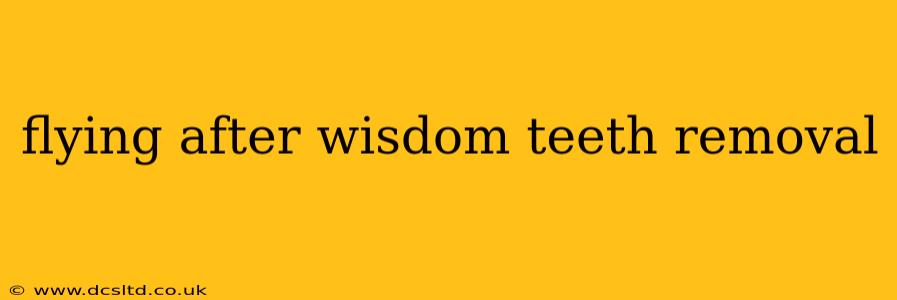Having your wisdom teeth removed is a significant procedure, and recovering properly is crucial. One common post-operative question revolves around air travel. Flying after wisdom teeth removal presents unique challenges due to the potential for complications related to altitude changes and the post-operative healing process. This guide will address your concerns and help you make informed decisions about flying after your procedure.
How Soon Can I Fly After Wisdom Teeth Removal?
This is perhaps the most frequently asked question. There's no single definitive answer, as the ideal timeframe depends on several factors, including:
- The complexity of the surgery: Simple extractions heal faster than complex ones requiring bone removal or sutures.
- Your individual healing process: Everyone heals at a different rate.
- Your surgeon's recommendations: Your oral surgeon is the best source of information regarding your specific case. They'll consider your individual circumstances and provide personalized advice.
Generally, most oral surgeons recommend waiting at least 7 to 10 days after a straightforward wisdom teeth extraction before flying. For more complex procedures, this waiting period could extend to two to three weeks or even longer.
What Happens if I Fly Too Soon After Wisdom Teeth Removal?
Flying too soon after surgery increases the risk of several complications:
- Increased bleeding: Changes in cabin pressure during ascent and descent can cause blood clots to dislodge, leading to increased bleeding or dry socket. Dry socket is a painful condition where the blood clot protecting the extraction site is lost.
- Infection: The lower air pressure in the cabin can increase the risk of infection at the extraction site.
- Pain exacerbation: Altitude changes can increase pain and discomfort at the surgical sites.
- Swelling: The changes in pressure might worsen swelling.
What Are the Risks of Flying After Wisdom Teeth Removal?
The risks associated with flying shortly after wisdom teeth extraction are primarily related to the pressure changes experienced during the flight. The reduced air pressure at high altitude can disrupt blood clot formation and healing, potentially leading to increased bleeding and post-operative discomfort. This risk is significantly heightened if the surgery involved stitches or bone removal.
Can I Fly with Dry Socket After Wisdom Teeth Removal?
No, you should absolutely not fly if you develop dry socket. This painful condition requires immediate medical attention, and the added stress of air travel could worsen it. Contact your oral surgeon immediately if you suspect you have dry socket.
What Should I Do to Prepare for a Flight After Wisdom Teeth Removal?
If your surgeon approves your flight, take these precautions:
- Follow post-operative instructions meticulously: Adhere strictly to your surgeon's instructions regarding pain medication, rinsing, and diet.
- Drink plenty of fluids: Staying hydrated helps with healing and reduces the risk of dehydration, which can be exacerbated by air travel.
- Avoid strenuous activities: Limit physical exertion before and during your flight.
- Pack necessary medications: Bring sufficient pain medication, antibiotics (if prescribed), and any other medications you need.
- Bring a comfortable neck pillow and eye mask: These can make the flight more comfortable.
- Consider bringing a soft-bristled toothbrush and mouthwash: This helps maintain good oral hygiene.
- Choose a direct flight: Minimize the time spent on the plane to reduce potential complications.
When Should I Contact My Oral Surgeon?
Contact your oral surgeon immediately if you experience:
- Excessive bleeding
- Severe pain
- Swelling that increases significantly
- Signs of infection (fever, pus)
- Dry socket
Conclusion: Prioritizing Your Health and Safety
Flying after wisdom teeth removal requires careful consideration. Always prioritize your health and safety. Consult with your oral surgeon to determine the appropriate timeframe before flying. Following their recommendations and taking necessary precautions will help ensure a smooth and safe travel experience after your surgery. Remember, your surgeon's advice is paramount in ensuring a successful recovery.
